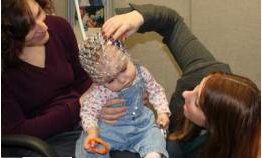Research suggests infants begin to learn about race in the first year
Share
Explore Our Galleries
Breaking News!
Today's news and culture by Black and other reporters in the Black and mainstream media.
Ways to Support ABHM?
by University of Massachusetts Amherst
Research by psychology researcher Lisa Scott and colleagues at the University of Massachusetts Amherst suggests that throughout the first year of life, babies are developing highly specialized perceptual abilities in response to important people in their environment, such as family members. This focus of attention to familiar groups of people compared to unfamiliar groups is hypothesized to be the root of later difficulties some adults have in identifying and recognizing faces of other races.
Scott says, “In addition to providing information critical for understanding how infants learn about the surrounding environment, the results of this research may serve as a guide for early education and interventions designed to reduce later racial prejudice and stereotyping” Scott states. “These results suggest that biases in face recognition and perception begin in preverbal infants, well before concepts about race are formed. It is important for us to understand the nature of these biases in order to reduce or eliminate them.”
Read about the study here.












Comments Are Welcome
Note: We moderate submissions in order to create a space for meaningful dialogue, a space where museum visitors – adults and youth –– can exchange informed, thoughtful, and relevant comments that add value to our exhibits.
Racial slurs, personal attacks, obscenity, profanity, and SHOUTING do not meet the above standard. Such comments are posted in the exhibit Hateful Speech. Commercial promotions, impersonations, and incoherent comments likewise fail to meet our goals, so will not be posted. Submissions longer than 120 words will be shortened.
See our full Comments Policy here.